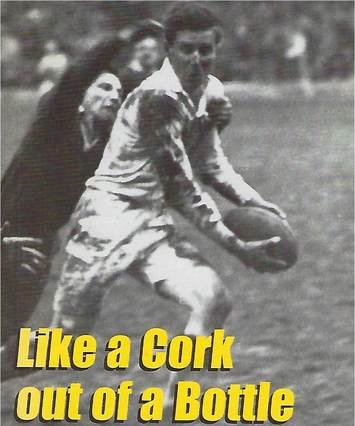Nadezhda Mandelstam, widow of the Russian poet who disappeared in the camps in 1938, wrote in her book, Hope Abandoned, this comment on the 20th century: 'I do not believe any preceding age has been marked by such a passion for self-advancement as ours. It is the disease of our time.' Also: 'Total absorption in oneself is a sure sign of mental illness, something to which whole nations may succumb as well as individuals.'
The alternative to this self-absorption is well-expressed in two sentences written about Henry Drummond: 'He made you believe that you were stronger and your work better than you dared to believe.' And: 'If you were alone with him, he was sure to find out what interested you and listen by the hour.'
How attractive that is.
Les Miserables, based on the novel by Victor Hugo, has been running as a successful musical worldwide for many years.
The scene is set in early 19th century France. A man, Jean Valjean, steals a loaf of bread to feed his starving family. He is caught and sentenced to the galleys for 19 years. After his release he goes from town to town looking for work but no one will employ him because he bears the permanent brand of a galley-slave. In his final despair he knocks on the door of a person who receives him royally, asks no questions and gives him a meal and a bed for the night. Valjean takes advantage of such treatment and escapes from the house with the silver he finds in his bedroom.
The police catch him and recognise the mark of the silver as belonging to the Bishop's palace. The Bishop says: 'But I gave the silver to him. But he forgot something. He forgot to take these candlesticks.' Valjean is confronted by a dimension of life which he did not believe existed.
It says in the novel: 'When the convict came, [the Bishop] did not even ask from what country he came nor what was his history. The convict had his misfortune only too present in his mind and the Bishop's aim was to divert him from it and make him believe he was a person like any other.'
Valjean then sets out to do for someone else what was so miraculously and naturally done for him.
Helping others, encouraging people, is not a technique; it is a love that comes from a deep inner life. It cannot be obtrusively done. Barnabas does not get much publicity in the New Testament. But without his unselfish care and friendship the apostle Paul would surely not have become the man he did.
One of the founders of the Cistercians, Stephen Harding, said eight centuries ago: 'The real leader of men is the man who can make others believe they are accompanying him not following. He is the man who is wise enough to recognise, respect and show due reverence to the manhood in other men. He is the man who wins their confidence by showing his confidence in them.'
H G Wells wrote: 'The test of greatness is what a man leaves to grow. By this criterion Jesus stands first.'
Selfish ambition makes a person touchy. Faith cannot grow on such a soil nor can anyone grow round such a person. There is very little room on a ladder.
St Peter in his first epistle wrote: 'Now that you have, by observing the truth, made your souls clean enough for a genuine love of your fellows, see that you do love each other fervently and from the heart.'
Honesty, purity, love. Here is the root that enables us to draw out the best in people.
St Paul wrote: 'Always aim at the highest in each other and in the whole world.' (1 Thessalonians 5:11)
It is good to keep asking ourselves: Do we enable the people around us and the people we meet to be at their best and rise to their full stature? Are we making openings for others or are we only interested in running with the ball ourselves?
English


